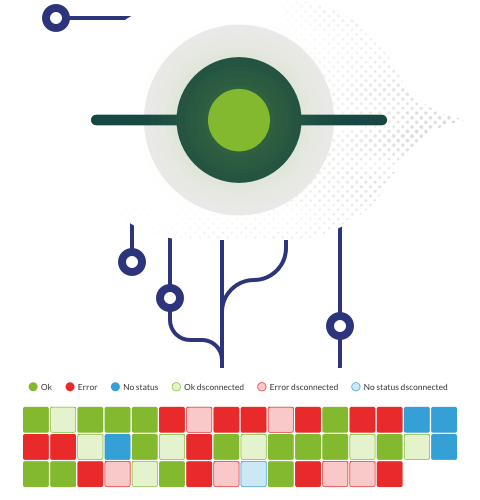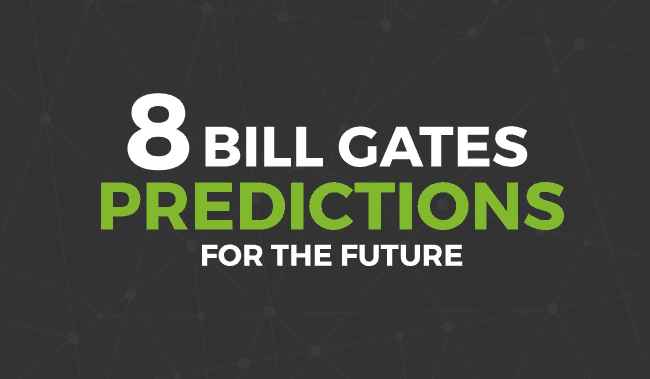8 Bill Gates predictions about our future. Find out more here!
If you’ve lived on planet Earth in the past few years, we are pretty sure that you know who Bill Gates is. He is the popular founder of Microsoft, who has recently become a great philanthropist.
Once he became famous during the 80’s, the opinion of Bill Gates has been heard and taken seriously due to its success and his visionary nature. In 1999, he wrote a book called “Business at the speed of thought”, in which he made 15 predictions about the future use of technology, which were quite risky at the time. So far, all of these have been fulfilled.
Don’t you think this is quite amazing? Considering his successes in the past, we should keep in mind those Bill Gates predictions about the future. During the last few years, he has talked about some predictions about the future of our world. Do you want to find out some of them?
Automation will bring an end to millions of jobs
We don’t know when this will happen but we are sure that it will happen, this is already in progress and soon it will be increasingly visible. According to Gates, during the next 20 years work automation will become massive, which will mean that millions of human workers will be replaced by robots, intelligent and automated systems.
One of the measures in order to soften the harmful effects of this phenomenon would be to impose taxes on the robots that cause these job losses and establish transition programs for the most affected groups. And according to Gates, we should never stop the advance of these technologies.
The next technology boom
This prediction was carried out in an A.M.A. (Ask Me Anything) made by Reddit users, in 2013. According to Gates, the robots, the screens placed everywhere, and the interaction through voice will be those technologies with the greatest impact for the consumer in the next few years.
Be aware of Artificial Intelligence
According to Gates, and during the same interview in 2013, after the replacement of millions of workers by artificial intelligence, these robots could become a serious threat. Thus, as their development progress, they could surpass human beings when it comes to intelligence, and they could destroy them and replace them. Here, he seems to disagree with the opinion of Ray Kurzweil, who, as we previously mentioned in this other article, believes that artificial intelligence will not destroy human beings, but will be integrated with them.
Jobs of the future
If you are currently considering your job, you should take into account this statement. According to Gates, in a series of tweets published in his account in 2017 (from a speech given at Columbia University), some of the fields that will have a greater boom in the coming years will be in the industry of clean energy research, biotechnology and the development of artificial intelligence.
The burst of clean energy in 2030
This is a massive prediction. According to statements by Bill Gates in 2016, in 2030 most of the energy that will supply the world will come from clean sources.
Either wind or solar, according to Gates, in 2030 the world will be quite different as far as power generation is concerned. In fact, Gates himself wanted to be part of that future, creating in 2012 an investment fund of 1,000 million dollars, aimed at researching clean energy in order to fight global warming. Will we be able to finally breathe a cleaner air?
In 2030, bioterrorism could kill millions of people
This is another important prediction of these Bill Gates predictions. Watch out for this Gates prediction. In February 2017, at a conference held in Munich, he said that in 2030 a bioterrorist attack (for example, a synthetic virus or an unusually lethal flu) could cause more than 30 million deaths in just one year, according to the references that he had been given by expert epidemiologists. … We hope he’s wrong.
Universal mobile banking in 2030
According to Gates, the use of financial services through a smartphone will grow in the coming years, which will especially affect poor countries.
Thanks to this development, billions of people who currently don’t have a bank account, will be able to have one and use it, which will mean an improvement in their quality of life.
The end of poor countries, in 2035
In a letter written in 2014, Gates said that poor countries will have disappeared almost in their entirety by 2035, and will become more developed countries. According to Gates, factors such as new vaccines, better seeds or the digital revolution will be be essential for this achievement. As we already know, both Bill Gates and his wife, Melinda, have been working for years to achieve this goal, through their foundation.
These are some of the Bill Gates predictions on how technology will change our lives in the near future. Most are optimistic, although some of them are quite grim. Will we survive the arrival of Artificial Intelligence? Will the term “poor country” be left behind? These are questions that many people, with their constant work, are answering little by little.
Do you know more Bill Gates predictions? Would you like to let us know?
You can do that by leaving a comment in the comment section down below.
Do you agree with Bill Gates and with these Bill Gates predictions? What are your thoughts or predictions? Let us know down below!!
We don’t actually know if these events will happen but what we do know is that the Pandora FMS team is working towards the future. Don’t you know what Pandora FMS is? It is a flexible monitoring system that adapts to the needs of your company or organization.
Do you want to know what Pandora FMS can do for you? Click here: https://pandorafms.com
Or if you have any question about Pandora FMS, you can let us know by writing in the contact form that can be found at the following address: https://pandorafms.com/company/contact/
We will be happy to help you!
Pandora FMS’s editorial team is made up of a group of writers and IT professionals with one thing in common: their passion for computer system monitoring. Pandora FMS’s editorial team is made up of a group of writers and IT professionals with one thing in common: their passion for computer system monitoring.





















